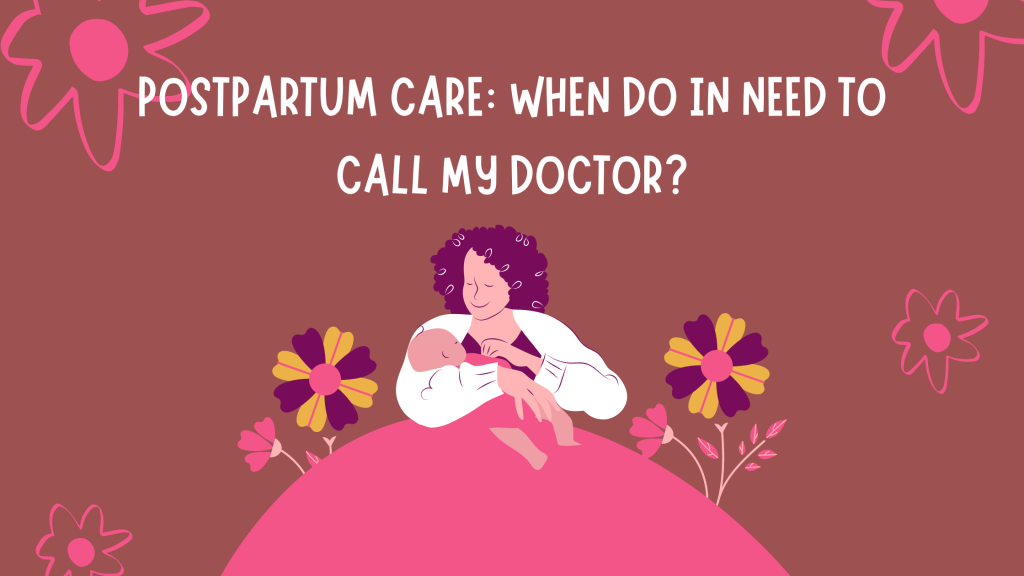Postpartum Care: When do I need to call my doctor?
Posted on Wednesday, January 18th, 2023 at 5:15 am

In our last blog post, we talked about what is normal in the postpartum period. But, what is NOT normal? In the second part of our 3-part series, we are going to look at five things you should let your doctor know about immediately.
- Heavy vaginal bleeding
Whether a woman has a vaginal delivery or a Cesarean section (aka C-section), some vaginal bleeding after delivery is normal. Typically, it is heavier in the first 24 hours after delivery. After that, the bleeding starts to decrease. First it will be like a normal period, then taper down to spotting, and finally, it will stop. The amount of time that a woman bleeds after giving birth varies from a couple weeks to up to six weeks. The key is that the vaginal bleeding should gradually decrease overtime. If the bleeding suddenly increases — you begin to completely fill a pad in an hour for at least two hours — you should notify your doctor or seek medical attention.
- Foul-smelling vaginal discharge
Lochia, a mixture of blood and mucus, is the normal discharge that occurs after delivery. Normal lochia does not have a foul-smelling odor to it. If you notice a significant odor to your discharge, you should notify your doctor or seek medical attention.
- Pus from your C-section incision
If you have had a C-section, the hospital will let you know the best way to care for your incision at home. Some women have stitches, and some have staples. There could be little strips of adhesive tape, glue, or nothing at all. Regardless of how your doctor closes your incision, you might experience a few drops of blood or fluid on your dressing or underwear. This is ok. However, experiencing pus, large amounts of blood-tinged fluid, or heavy bleeding is not normal. Anything that is heavy enough to fill a thick pad or bandage with fluid or any amount of pus is a reason to notify your doctor or seek medical attention.
- Fever
A fever of 100.4 or greater is something that should be evaluated. There are many reasons that a woman could have a fever after giving birth. It could be related to the breasts, the uterus, your incision, or even a respiratory infection. No matter the reason, it is not normal to have a fever of 100.4 or greater and you should notify your doctor or seek medical attention.
- Red, painful breasts
Whether you are breastfeeding or bottle feeding, your breasts can become engorged due to the increased blood flow to the breasts after delivery. The increased blood flow to your breasts encourages milk production. Breast engorgement can lead to discomfort. Warm compresses to the breasts, massaging the breasts before nursing, or pumping the breasts can help soothe discomfort. If you are not breastfeeding, it is no longer recommended that you bind your breasts. A good supporting bra is recommended. Acetaminophen, or Tylenol, can help ease discomfort. However, if your breasts become painful AND red, that could be a sign of an infection called mastitis. If one or both of your breasts become red and swollen, you should notify your doctor or seek medical attention.
In summary, here are five reasons to reach out to your doctor or seek immediate medical attention:
- Vaginal bleeding that suddenly increases and is heavy enough to fill a pad in an hour for at least two consecutive hours.
- A significant odor to your lochia, (aka vaginal discharge) after delivery.
- Heavy drainage from your C-section incision — enough to fill a thick pad or bandage with fluid —or if any amount of pus is noted.
- A fever of 100.4 or greater.
- Red, painful breasts.
Well, there you have it! You are equipped with a few facts about what could require a call to your doctor after delivery. In our next discussion, we will talk about postpartum depression.
Until then, be well and make sure to show yourself love and grace.
Dr. Kristin Williams
Medical Director of Women’s Health Specialists of North Texas
This blog provides general information and discussions about health and related topics. The information and other content provided in this blog, or in any linked materials, are not intended and should not be construed as medical advice. This information is not a substitute for professional medical expertise or treatment.
If you or any other person has a medical concern, please consult with your healthcare provider, or seek other professional medical treatment. Never disregard professional medical advice or delay seeking care based on the information you have read on this blog or in any linked materials. If you think you may have a medical emergency, call or go to the Emergency Room or dial 9-1-1.
